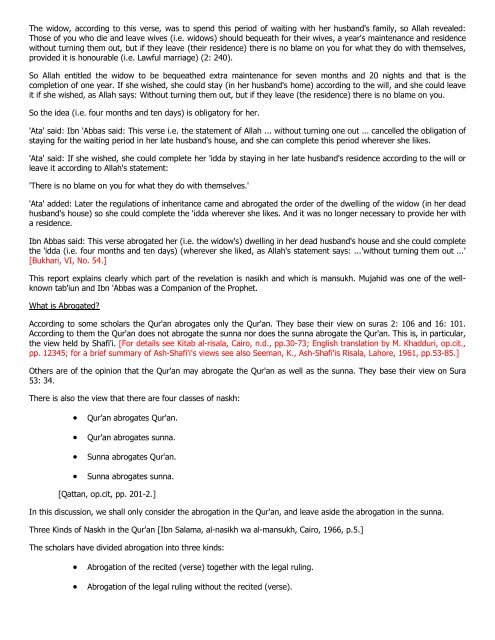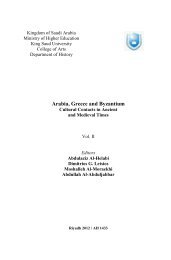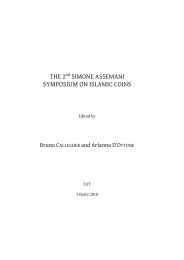ulum-al-quran
ulum-al-quran
ulum-al-quran
You also want an ePaper? Increase the reach of your titles
YUMPU automatically turns print PDFs into web optimized ePapers that Google loves.
The widow, according to this verse, was to spend this period of waiting with her husband's family, so Allah reve<strong>al</strong>ed:<br />
Those of you who die and leave wives (i.e. widows) should bequeath for their wives, a year's maintenance and residence<br />
without turning them out, but if they leave (their residence) there is no blame on you for what they do with themselves,<br />
provided it is honourable (i.e. Lawful marriage) (2: 240).<br />
So Allah entitled the widow to be bequeathed extra maintenance for seven months and 20 nights and that is the<br />
completion of one year. If she wished, she could stay (in her husband's home) according to the will, and she could leave<br />
it if she wished, as Allah says: Without turning them out, but if they leave (the residence) there is no blame on you.<br />
So the idea (i.e. four months and ten days) is obligatory for her.<br />
'Ata' said: Ibn 'Abbas said: This verse i.e. the statement of Allah ... without turning one out ... cancelled the obligation of<br />
staying for the waiting period in her late husband's house, and she can complete this period wherever she likes.<br />
'Ata' said: If she wished, she could complete her 'idda by staying in her late husband's residence according to the will or<br />
leave it according to Allah's statement:<br />
'There is no blame on you for what they do with themselves.'<br />
'Ata' added: Later the regulations of inheritance came and abrogated the order of the dwelling of the widow (in her dead<br />
husband's house) so she could complete the 'idda wherever she likes. And it was no longer necessary to provide her with<br />
a residence.<br />
Ibn Abbas said: This verse abrogated her (i.e. the widow's) dwelling in her dead husband's house and she could complete<br />
the 'idda (i.e. four months and ten days) (wherever she liked, as Allah's statement says: ...'without turning them out ...'<br />
[Bukhari, VI, No. 54.]<br />
This report explains clearly which part of the revelation is nasikh and which is mansukh. Mujahid was one of the wellknown<br />
tab'iun and Ibn 'Abbas was a Companion of the Prophet.<br />
What is Abrogated<br />
According to some scholars the Qur'an abrogates only the Qur'an. They base their view on suras 2: 106 and 16: 101.<br />
According to them the Qur'an does not abrogate the sunna nor does the sunna abrogate the Qur'an. This is, in particular,<br />
the view held by Shafi'i. [For details see Kitab <strong>al</strong>-ris<strong>al</strong>a, Cairo, n.d., pp.30-73; English translation by M. Khadduri, op.cit.,<br />
pp. 12345; for a brief summary of Ash-Shafi'i's views see <strong>al</strong>so Seeman, K., Ash-Shafi'is Ris<strong>al</strong>a, Lahore, 1961, pp.53-85.]<br />
Others are of the opinion that the Qur'an may abrogate the Qur'an as well as the sunna. They base their view on Sura<br />
53: 34.<br />
There is <strong>al</strong>so the view that there are four classes of naskh:<br />
<br />
<br />
<br />
<br />
Qur'an abrogates Qur'an.<br />
Qur'an abrogates sunna.<br />
Sunna abrogates Qur'an.<br />
Sunna abrogates sunna.<br />
[Qattan, op.cit, pp. 201-2.]<br />
In this discussion, we sh<strong>al</strong>l only consider the abrogation in the Qur'an, and leave aside the abrogation in the sunna.<br />
Three Kinds of Naskh in the Qur'an [Ibn S<strong>al</strong>ama, <strong>al</strong>-nasikh wa <strong>al</strong>-mansukh, Cairo, 1966, p.5.]<br />
The scholars have divided abrogation into three kinds:<br />
<br />
<br />
Abrogation of the recited (verse) together with the leg<strong>al</strong> ruling.<br />
Abrogation of the leg<strong>al</strong> ruling without the recited (verse).





